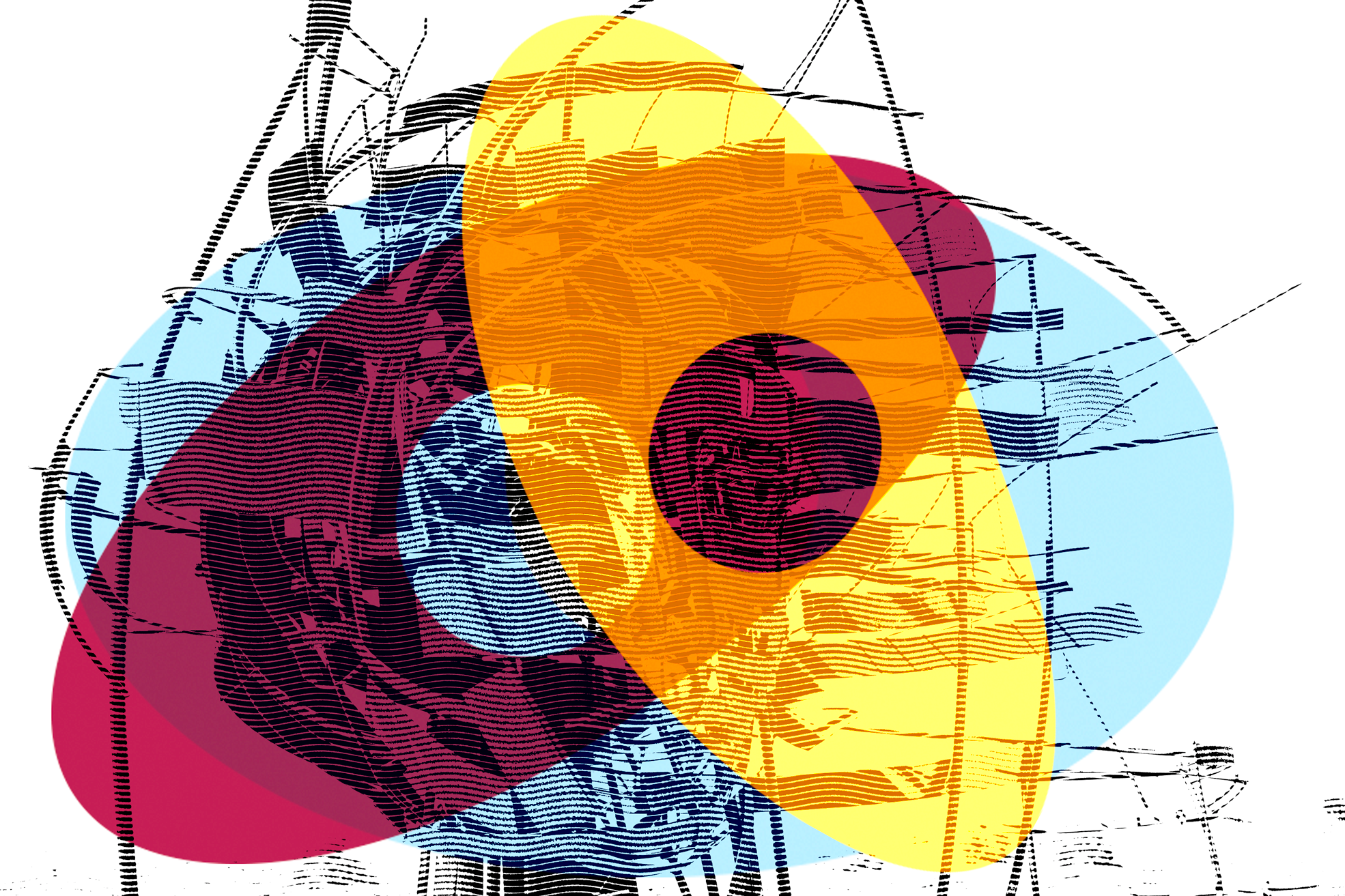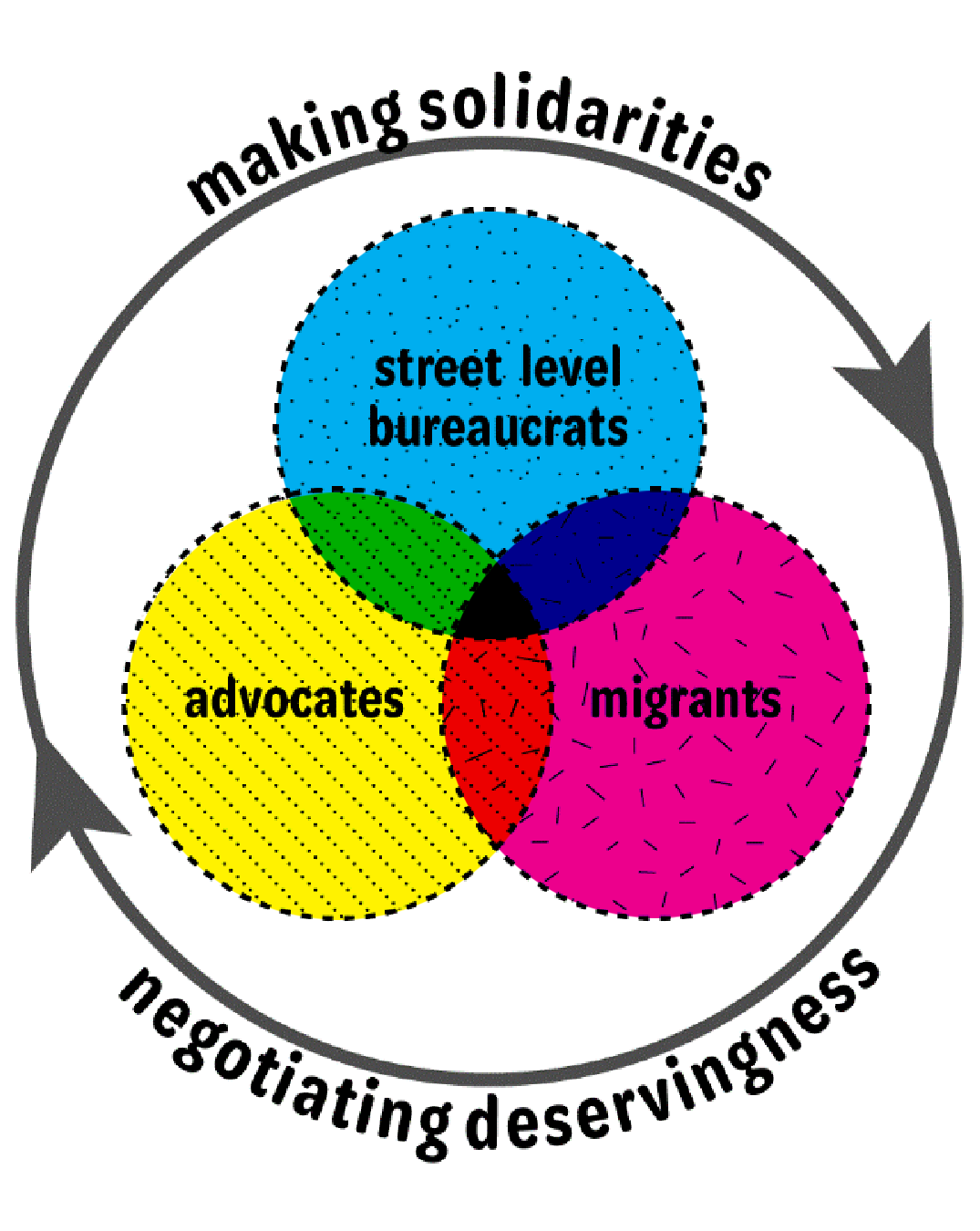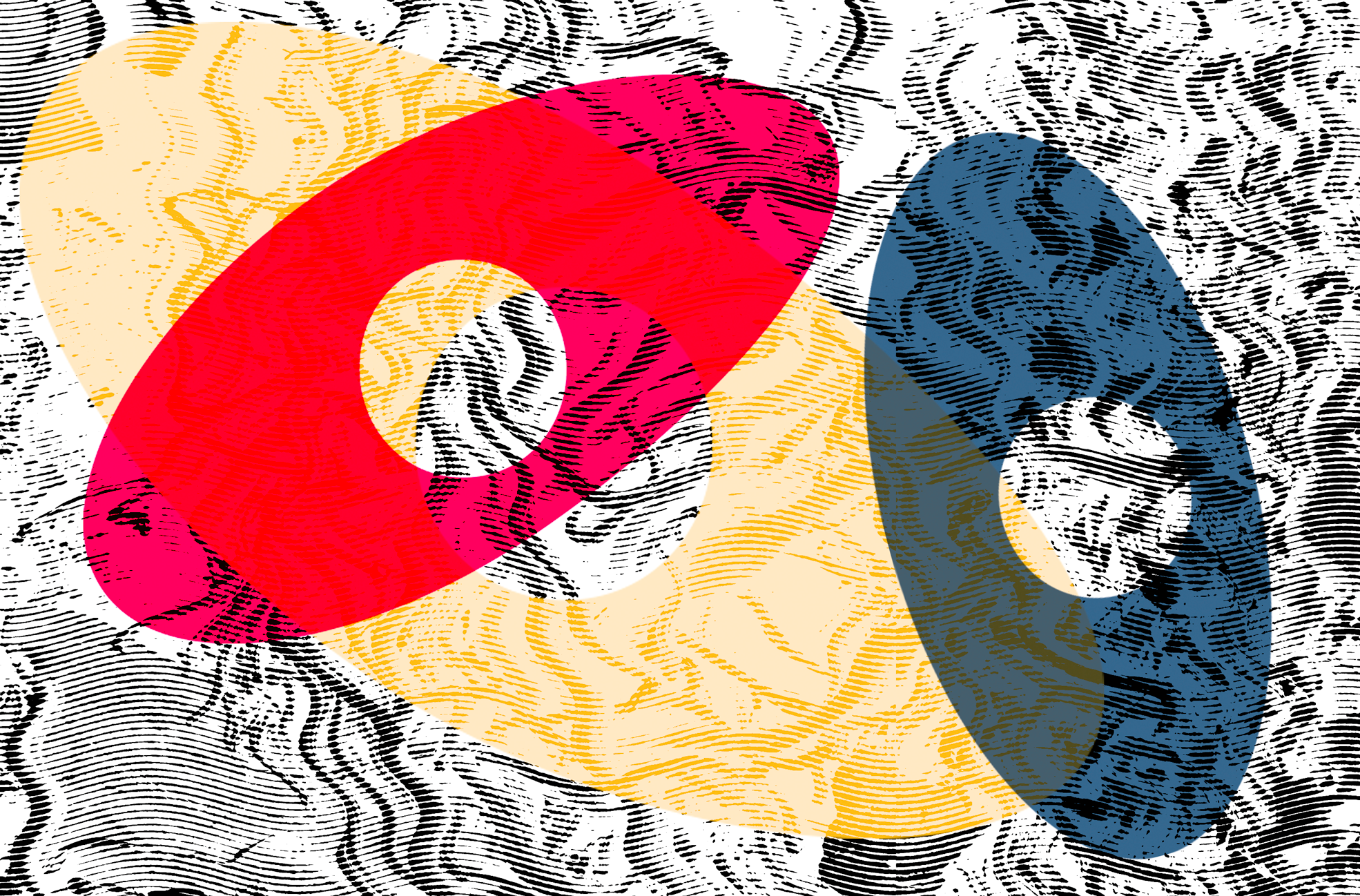Migrants and solidarities
Negotiating deservingness in welfare micropublics (SOLIDARITIES)
This research project breaks new ground by exploring how solidarities are imagined and practiced in negotiations of migrant deservingness. It explores the fundamental question of who is, and who is not, considered deserving of welfare services, how deservingness is negotiated and with what implications, in a context of increasing diversity driven by migration, welfare restructuring, and austerity. Such negotiations serve to draw boundaries between those migrants who have access to the support and services of the welfare state, or are believed to have access, and those who are excluded, e.g. because they are deemed as ‘not belonging’ or are seen as responsible for their own neediness.
Methodology
Setting out from the understanding that solidarities are imagined and practiced in diverse ways, SOLIDARITIES explores emerging forms of conviviality, friction and contestation. Different forms of solidarities will be made visible and comparable by exploring how they are informed by different constellations of welfare and migration regimes, in both urban areas and rural / small towns with varying degrees of diversity and migrant settlement. Our multi-sited ethnography in Denmark, Sweden, and the UK will focus on six welfare micropublics.
We focus on how deservingness is constituted according to migrants’ generational status and according to spatial dimensions of the neighbourhood where migrants settle. We aim for a deep and nuanced understanding of how deservingness is negotiated, and how different forms of solidarities are practiced, in encounters between migrants, frontline government workers, and advocates who offer and provide support for migrants.
Case studies
Spatial/neighbourhood dimension
- Dispersal and deservingness in northeast England
- In the waiting-room: Asylum seekers and the negotiation of deservingness between inclusion and exclusion in Sweden
- Refugees and deservingness: Negotiations of solidarity in a rural welfare micropublic in Denmark
Generational dimension
Research questions
- How, when, where, and by whom is the deservingness of migrants established within welfare micropublics, and with what outcomes?
- How do migrants’ generational positions and spatial locations inform these micropublic negotiations and with what effect (if any) on migrants’ access to welfare services and support?
- How do micropublic negotiations of migrant deservingness, within and across the case-studies, make, unmake, and remake practised and imagined solidarities, and what are the implications for their respective welfare and migration regimes?
Core project concepts
Solidarity
Solidarity is a classic social science concept, often understood as social cohesion, mutual aid or collective socio-political projects. Solidarities are both imagined and practiced, with varying degrees of exclusivity. Traditionally, solidarity was viewed as emerging within static identity groups. In this research, we focus on the dynamism of solidarities forged through contestations of difference and commonality.
Welfare micropublics
Welfare micropublics refers to local spaces where entitlement to support and services are negotiated. While welfare and migration policy is typically made at the (supra)national level, scholarship increasingly recognises the involvement of different actors and institutions in implementing but also shaping, changing, and producing variations in national policies within micropublics. Those explored in SOLIDARITIES involve multi-level state institutions, private enterprises, and civil society including migrants, advocacy groups, and social movements.
Generation
Generation is used in SOLIDARITIES in reference to social position and social relations. Categories of childhood, adulthood, and old age are socially produced, imbued with context- and historically- specific meanings, with implications for how groups and individuals are rendered (un)deserving. Young children and elderly people of the ‘majority population’ are often considered among the most deserving across Europe, while migrants are considered the least deserving. However, these generational positions intersect with gender, ethnicity, dominant language ability, and migration status, affecting understandings of deservingness and ability to leverage it to access service.
Spatiality and neighbourhood
Spatiality and neighbourhood are markers for the places in which social relations are developed and solidarities negotiated. Asylum seekers and refugees are often placed in peripheral areas and small towns in decline that are struggling to keep services open, raising questions about the role of the local state in refugee settlement and integration. Dispersal is a contentious policy across Europe, however, and has been critiqued as part of a punitive approach to deterring migration. As newcomers are placed in separate housing areas, and local areas diversify rapidly, austerity policies and privatisation of services create a sense of a zero-sum game. Notions of deservingness are (re)constituted as long-term belonging and residency come into conflict with the positioning of new migrants.
Promoting dialogue
SOLIDARITIES is characterised by a commitment to promoting dialogue, reflection, and mutual learning. The project brings together an international team of anthropologists and sociologists, with an expert Academic Advisory Board and key stakeholder representatives. Stay tuned to this website where we will share publications, reports, blogs, and provide news about project events including the launch of a documentary film and exhibit.
We would love to hear from you. Get in touch!
Migrants and solidarities
Negotiating deservingness in welfare micropublics (SOLIDARITIES)
This research project breaks new ground by exploring how solidarities are imagined and practiced in negotiations of migrant deservingness. It explores the fundamental question of who is, and who is not, considered deserving of welfare services, how deservingness is negotiated and with what implications, in a context of increasing diversity driven by migration, welfare restructuring, and austerity. Such negotiations serve to draw boundaries between those migrants who have access to the support and services of the welfare state, or are believed to have access, and those who are excluded, e.g. because they are deemed as ‘not belonging’ or are seen as responsible for their own neediness.
Methodology
Setting out from the understanding that solidarities are imagined and practiced in diverse ways, SOLIDARITIES explores emerging forms of conviviality, friction and contestation. Different forms of solidarities will be made visible and comparable by exploring how they are informed by different constellations of welfare and migration regimes, in both urban areas and rural / small towns with varying degrees of diversity and migrant settlement. Our multi-sited ethnography in Denmark, Sweden, and the UK will focus on six welfare micropublics.
We focus on how deservingness is constituted according to migrants’ generational status and according to spatial dimensions of the neighbourhood where migrants settle. We aim for a deep and nuanced understanding of how deservingness is negotiated, and how different forms of solidarities are practiced, in encounters between migrants, frontline government workers, and advocates who offer and provide support for migrants.
Case studies
Spatial/neighbourhood dimension
- Dispersal and deservingness in northeast England
- In the waiting-room: Asylum seekers and the negotiation of deservingness between inclusion and exclusion in Sweden
- Refugees and deservingness: Negotiations of solidarity in a rural welfare micropublic in Denmark
Generational dimension
Research questions
- How, when, where, and by whom is the deservingness of migrants established within welfare micropublics, and with what outcomes?
- How do migrants’ generational positions and spatial locations inform these micropublic negotiations and with what effect (if any) on migrants’ access to welfare services and support?
- How do micropublic negotiations of migrant deservingness, within and across the case-studies, make, unmake, and remake practised and imagined solidarities, and what are the implications for their respective welfare and migration regimes?
Core project concepts
Solidarity
Solidarity is a classic social science concept, often understood as social cohesion, mutual aid or collective socio-political projects. Solidarities are both imagined and practiced, with varying degrees of exclusivity. Traditionally, solidarity was viewed as emerging within static identity groups. In this research, we focus on the dynamism of solidarities forged through contestations of difference and commonality.
Welfare micropublics
Welfare micropublics refers to local spaces where entitlement to support and services are negotiated. While welfare and migration policy is typically made at the (supra)national level, scholarship increasingly recognises the involvement of different actors and institutions in implementing but also shaping, changing, and producing variations in national policies within micropublics. Those explored in SOLIDARITIES involve multi-level state institutions, private enterprises, and civil society including migrants, advocacy groups, and social movements.
Generation
Generation is used in SOLIDARITIES in reference to social position and social relations. Categories of childhood, adulthood, and old age are socially produced, imbued with context- and historically- specific meanings, with implications for how groups and individuals are rendered (un)deserving. Young children and elderly people of the ‘majority population’ are often considered among the most deserving across Europe, while migrants are considered the least deserving. However, these generational positions intersect with gender, ethnicity, dominant language ability, and migration status, affecting understandings of deservingness and ability to leverage it to access service.
Spatiality and neighbourhood
Spatiality and neighbourhood are markers for the places in which social relations are developed and solidarities negotiated. Asylum seekers and refugees are often placed in peripheral areas and small towns in decline that are struggling to keep services open, raising questions about the role of the local state in refugee settlement and integration. Dispersal is a contentious policy across Europe, however, and has been critiqued as part of a punitive approach to deterring migration. As newcomers are placed in separate housing areas, and local areas diversify rapidly, austerity policies and privatisation of services create a sense of a zero-sum game. Notions of deservingness are (re)constituted as long-term belonging and residency come into conflict with the positioning of new migrants.
Promoting dialogue
SOLIDARITIES is characterised by a commitment to promoting dialogue, reflection, and mutual learning. The project brings together an international team of anthropologists and sociologists, with an expert Academic Advisory Board and key stakeholder representatives. Stay tuned to this website where we will share publications, reports, blogs, and provide news about project events including the launch of a documentary film and exhibit.
We would love to hear from you. Get in touch!






